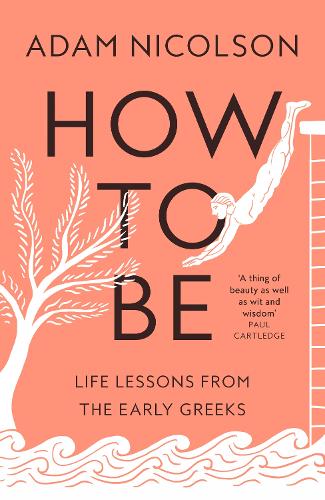Adam Nicolson’s seductive new book –a voyage around early Greek thought – opens with a lovely passage. Moored with his wife off the island of Samos, Nicolson rises at first light, with ‘only the cats awake’, to find that other boats have come in during the night and laid their anchor lines over his. Our action-man author dives in and swims down ‘the 12 feet or so to the sandy sea floor, hand over hand and link by link down the chain, looking for the tangle that needed to be undone’. It’s a metaphor for the task he sets himself in How To Be, which aims to separate out the strands of thought that originated in Greece between 650 and 450 BC.
Already there’s a lesson here. Anyone who assumed the Greek miracle mainly happened in Athens will be reminded that the early breakthroughs occurred in the islands on the far side of the Aegean over by Turkey (Homer, Heraclitus), and later migrated to southern Italy and Sicily (Pythagoras, Empedocles). As part of his remit, Nicolson visits (or recalls his visits to) these sun-struck spots to soak up their psycho-geography. His organising thesis is that western thought arose from a ‘harbour mind’, one that was attuned to the meeting of land and water, open to the flux of the sea while aware of the fixedness of land. He maps this on to Bertrand Russell’s observation that philosophy was born out of the ‘conflict of two very different human impulses, the one urging men towards mysticism, the other urging them towards science’.
This is hard to prove one way or another. You might equally well argue that the clarity of light in the Aegean had an effect, or the impassable rockiness of the interiors. Yet it finds its truth in the person of Odysseus, the hero of Nicolson’s first exemplary text, a sailor and an embodiment of ambiguity. Usefully for this project, the Odyssey is crammed with life lessons. That could be a book in itself. Each adventure yields a moral, from the dangers of drugs (the Lotus Eaters) to the superiority of brains over brawn (the Cyclops) to the nature and essential value of love (the ending).
But Nicolson, who has already covered the territory better in his book about Homer, hurries on to the pre-Socratic philosophers. We get chapters on figures from Anaximander to Zeno, handled confidently but sometimes confusingly. For example, when responding to Heraclitus’ remark that you can’t step in the same river twice, Nicolson describes the verbal intricacy of the Greek epigram as ‘a recognition of the rhyming complexity of reality: same-and-not-same, this-and-not-this, you-and-not-you, now-and-not-now, dramatising our presence within that reality’.
As the late Martin Amis demonstrated in some of his less successful books, the task of writers isn’t only to write well. It’s also to find the subject that suits their style. Nicolson, the progeny of poets, is more convincing writing about poetry than philosophy. I was left unsure what ‘life lessons’ relevant to today we can hope to find from a man who believed the world was made of water (Thales) or from one who thought it was made of fire (Heraclitus).
Indeed, the liveliest passages in the book are about the thinkers least likely to offer helpful advice. Thales, the story goes, was once so engrossed in studying the night sky that he tumbled into a well – to the hilarity of the Thracian slave girl who was watching. Pythagoras wasn’t just a mathematician. He was also a madman. He lived in a hole in the ground from which he eventually emerged to declare that he had visited the land of the dead. In an early instance of sex negativity, when asked to name the most fitting times for love-making, Pythagoras replied: ‘Whenever you wish to be weaker than yourself.’ His follower, Empedocles, declared that in a past life he had been a bush.
Other consolations include the author’s deft treatment of the poets on the island of Lesbos. He singles out Archilochus’s epitaph on a defeated enemy, which has the concision of an instapoem: ‘In the hospitality of war, /we left them their dead /as a gift to remember us by.’ Soon afterwards, we get Sappho’s lines to a female lover, which read like a reply to Archilochus: ‘I would rather see her lovely step /and the movement of light on her face /than chariots of Lydians or ranks /of foot-soldiers in arms.’
How to Be, then, is best taken not as the self-help book its title implies but as a poetic tour of philosophical thought which persuades us that, on the contrary, the pre-Socratics are the last people to look to for life advice. As Socrates himself observed wryly about Thales’s pratfall: ‘Philosophers always look like idiots.’

